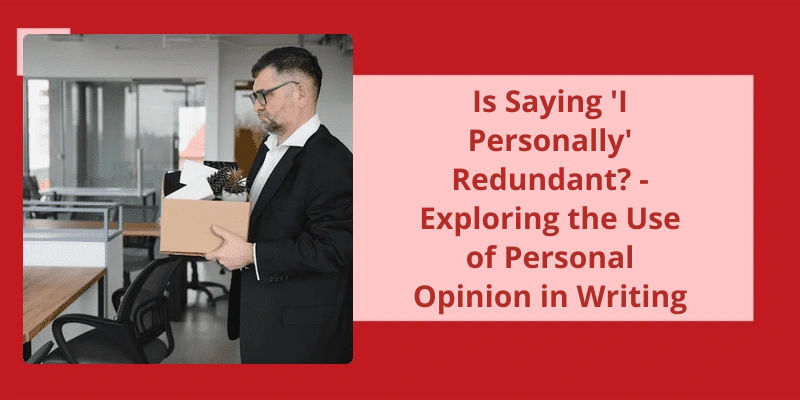Language is a complex and nuanced system that’s ever evolving. As such, it isn’t uncommon for certain phrases or expressions to be scrutinized and debated for their necessity or redundancy. One such phrase that’s been the subject of such scrutiny is "I personally." While some argue that including the word "personally" is unnecessary and redundant, others believe that it adds a layer of meaning that wouldn’t be present otherwise. At the heart of this debate lies the question of whether this phrase is truly redundant or if it serves a purpose in conveying a personal opinion that may not be easily expressed without it.
Is It Correct to Use I Personally?
When it comes to language use, there are often different ways to convey meaning and express oneself. One potential example of this is the use of the phrase “I personally.”. While some may argue that this phrase is redundant or unnecessary, others may find it to be a helpful tool for emphasizing ones own perspective and opinion.
Using “personally” after “I” can signal to the listener or reader that the following statement isn’t meant to be a universal or objective truth, but rather a personal viewpoint. This can be useful in situations where one wants to acknowledge their own subjectivity or allow for the possibility of varying perspectives.
After all, who else would ones opinion be coming from if not oneself? In these cases, one could arguably just say “I think” or “I believe” and achieve the same effect.
Depending on context and tone of voice, using this phrase could come across as confrontational or dismissive of others opinions. For example, saying “I personally don’t like that idea” could imply that the speaker thinks less of anyone who disagrees.
For others, it may not be necessary or may even come across as off-putting. As with any tool in language use, it’s important to consider the potential effects and alternatives before deciding whether or not to use it.
The History and Development of the Phrase “I Personally” in Language Use
This article explores the origins and evolution of the phrase “I personally.” It traces it’s usage back to ancient times and showcases how this phrase has developed over the years to become a ubiquitous part of modern language. Overall, the article provides a fascinating look into our linguistic history and sheds light on how language use constantly evolves.
In any conversation or text, it’s important to communicate clearly and effectively. One aspect of language that can cause confusion is the use of redundant phrases or expressions. One such example is the use of “personally” when referring to oneself. Some people wonder if it’s correct to say “I personally” or “I myself”. Let’s explore the nuances of this language construction.
Is It Correct to Say I Personally?
The use of the phrase “I personally” has been a topic of debate among English language experts. Some argue that this phrase is redundant, as the word “I” already implies personal involvement or opinion.
This can be seen as an unnecessary addition, especially in cases where the writer is trying to limit the word count for a given piece of writing.
This can be seen in cases where the writer is trying to distinguish their own opinion from the opinions of others on the same matter.
However, it’s important for writers to consider whether or not this phrase adds significant meaning to their writing before including it in their work.
Let’s delve a bit deeper into the correct usage of the word “personally” in a sentence.
Is It Correct to Say We Personally?
This sentence is perfectly grammatically sound. It shows how personally can be used to indicate that something is being done in a direct and individual way. It’s often used to differentiate between something that’s being done in person versus through someone else or through a different medium.
Another example of the word personally being used in this context might be, “I’ll make sure to deliver the package personally.”. This sentence would indicate that the speaker is going to physically bring the package to a recipient themselves, rather than having someone else do it.
In some cases, however, people might use the word personally in a way that isn’t entirely grammatically correct. For example, someone might say “personally, I don’t like ice cream,” when what they really mean is “to be honest, I don’t like ice cream.”
It adds clarity and specificity to language and can be useful in many different contexts. Whether you’re writing a formal email, chatting with friends, or engaging in any other form of communication, using personally in an appropriate and grammatically correct way can help ensure that your meaning is clear and easily understood.
If you’re using it in a direct and actionable way, it’s grammatically correct. If you’re using it to merely express an opinion, it’s technically incorrect. As with any word in the English language, it’s important to understand it’s proper usage in order to effectively communicate with others. By using personally appropriately and in context, you can help ensure that your communication is clear, concise, and effective.
Now that we’ve gone over some example sentences that use the word “personally”, you may be wondering where exactly to place it in a sentence. It’s important to know the correct placement in order for your sentence to make sense and convey the intended meaning.
Where Do You Put Personally in a Sentence?
It’s important to understand the correct placement of the word “personally” in a sentence. While some may think it can be placed anywhere without affecting the meaning, this isn’t the case. It adds emphasis to the person performing the action or experiencing the feeling.
In the sentence “You’ll be held personally responsible for any losses or damages,” the word “personally” modifies the verb “held” indicating that the responsibility will be directly attributed to the person addressed in the statement. Without the word “personally,” the sentence would still convey the same idea, but with less emphasis on the accountability of the person.
Similarly, in the sentence “The player was personally criticized by his coach,” the word “personally” modifies the verb “criticized” indicating that the criticism was not directed at the players performance, but rather at the player as an individual.
In the sentence “He blamed me personally for causing the problem,” the word “personally” modifies the verb “blamed” indicating that the blame was specifically directed at the person being addressed.
In the sentence “I was personally offended by the article,” the word “personally” modifies the adjective “offended” indicating that the offense was taken on a personal level rather than a general one. Without the word “personally,” the sentence would still convey the idea of being offended, but with less emphasis on the personal nature of the feeling.
It adds emphasis and personalization to the statement, making it more impactful and meaningful.
Examples of Sentences Where “Personally” Is Incorrectly Placed and How It Affects the Meaning
“Personally, I believe he’s guilty” – This sentence implies that the speaker’s personal beliefs are in conflict with someone else’s beliefs.
“I believe personally he’s guilty” – This sentence implies that the speaker’s personal beliefs are being emphasized, but it’s redundant since “personally” is already implied by the use of “I believe.”
Source: Personally Definition & Meaning – Merriam-Webster
Now that we’ve a better understanding of how “personally” is used in a sentence, let’s dive deeper into it’s nuances and explore various examples that demonstrate it’s versatility. Whether in professional or personal settings, the use of “personally” can convey a range of meanings and implications that reveal much about the speaker’s intentions and attitude. So, let’s explore this word further and see all the different ways it can be used in a sentence.
What Does Personally Mean in a Sentence?
When someone uses the word “personally” in a sentence, it typically means that they’re emphasizing that they’re the one who’s responsible for or took part in the action being described. For example, if someone says “I personally approved the changes,” they’re indicating that they themselves reviewed and authorized the changes, rather than delegating the task to someone else.
Additionally, using the word “personally” can help to distinguish between different levels of involvement. For instance, if someone says “She replied to my letter,” it could be interpreted as meaning that she responded on behalf of someone else, such as a company or organization. But if someone says “She personally replied to my letter,” it implies that she herself took the time to write a response, rather than delegating the task to a subordinate.
For example, someone might say “Personally, I don’t think thats a good idea,” in order to emphasize that they’re speaking based on their own thoughts and feelings, rather than on behalf of a group or organization.
Whether used to indicate responsibility, ownership, or personal opinion, it’s a versatile and useful word that adds nuance and clarity to communication.
Different Contexts Where the Word “Personally” Can Be Used and How It’s Meaning Can Change in Each Context
- When giving a personal opinion:
Using “personally” at the beginning of a sentence can indicate that the speaker is sharing their own view, rather than making a statement that’s universally true. - When expressing a preference:
“Personally” can be used to convey a sense of individual preference rather than certainty. For example, “Personally, I prefer sweet coffee to bitter coffee.” - When speaking in a more intimate setting:
“Personally” can be used to create a sense of connection and empathy with the listener. For instance, “Personally, I understand how difficult it can be to lose a loved one.” - When disclaiming legal or financial advice:
“Personally” might be used to indicate that the speaker isn’t a professional or can’t offer an expert opinion. As an example, “Personally, I’d not advise you to invest in that stock, but it’s up to you.” - When making a distinction between public and private life:
“Personally” can be used to offer insight into the speaker’s personal beliefs or behaviors while acknowledging that other people may differ. As an example, “Personally, I don’t believe in social media, but I understand that many people find it useful.”
Conclusion
In conclusion, the term "I personally" isn’t redundant as it serves a crucial purpose in expressing one's personal opinion and adding emphasis to one's statement. Without it, the meaning of the statement could be lost or misinterpreted. It’s essential to recognize and uphold the value of such language constructs that allow for honest and open communication in both personal and professional settings.






